In vSphere 6.0 the command line interface esxcli has 2 new namespaces. The esxcli is a complete set of commands that you can use for troubleshooting, configuration or kickstart files. I have created and printed a mindmap to navigate through the namespaces more quickly. This post covers only basic namespaces, available on all ESXi 6.0 hosts. If you've installed additional software you might see more namespaces. I've also created a mindmap for ESXi 5.1 and ESXi 5.5.
ESXCLI in version 6.0 has 15 namespaces:
Available Namespaces:
device Device manager commands
elxnet elxnet esxcli functionality
esxcli Commands that operate on the esxcli system itself allowing
users to get additional information.
fcoe VMware FCOE commands.
graphics VMware graphics commands.
hardware VMKernel hardware properties and commands for configuring
hardware.
iscsi VMware iSCSI commands.
network Operations that pertain to the maintenance of networking on
an ESX host. This includes a wide variety of commands to
manipulate virtual networking components (vswitch,
portgroup, etc) as well as local host IP, DNS and general
host networking settings.
rdma Operations that pertain to remote direct memory access
(RDMA) protocol stack on an ESX host.
sched VMKernel system properties and commands for configuring
scheduling related functionality.
software Manage the ESXi software image and packages
storage VMware storage commands.
system VMKernel system properties and commands for configuring
properties of the kernel core system and related system
services.
vm A small number of operations that allow a user to Control
Virtual Machine operations.
vsan VMware VSAN commands.

DEVICE
The device namespace decrypts hardware information from device aliases (vmnic/vmhba).
![]()
ELXNET (New in vSphere 6.0)
Configuration and information about the Emulex OneConnect Converged Network Adapter.

ESXCLI
The esxcli namespace can be used to list all available namespaces and commands. I've used this command to get the list, export it to a CSV file to create this mindmaps.
![]()
FCOE
The fcoe namespace has Fibre Channel over Ethernet discovery and adapter listing capabilities.
![]()
GRAPHICS
The graphics adapter manages hardware-accelerated 3D graphics for virtual machines.
![]()
HARDWARE
The hardware namespace can be used to gather information about the physical hardware.
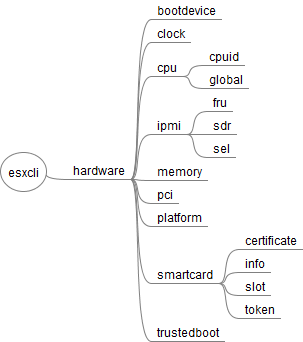
ISCSI
The iscsi namespace can be used to configure iscsi adapters. This can be really helpful in kickstart scripts, to configure shared storage arrays.
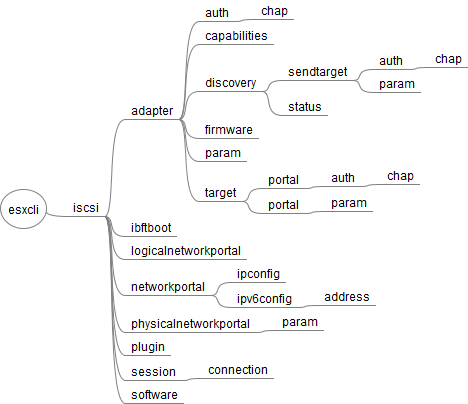
NETWORK
The network namespace is the most powerful namespace. You can configure local vSwitches and Distributed Virtual Switches (dvSwitch). You can also manage the local IP address and firewall configuration. This is a must have in your automated ESXi installation workflow.
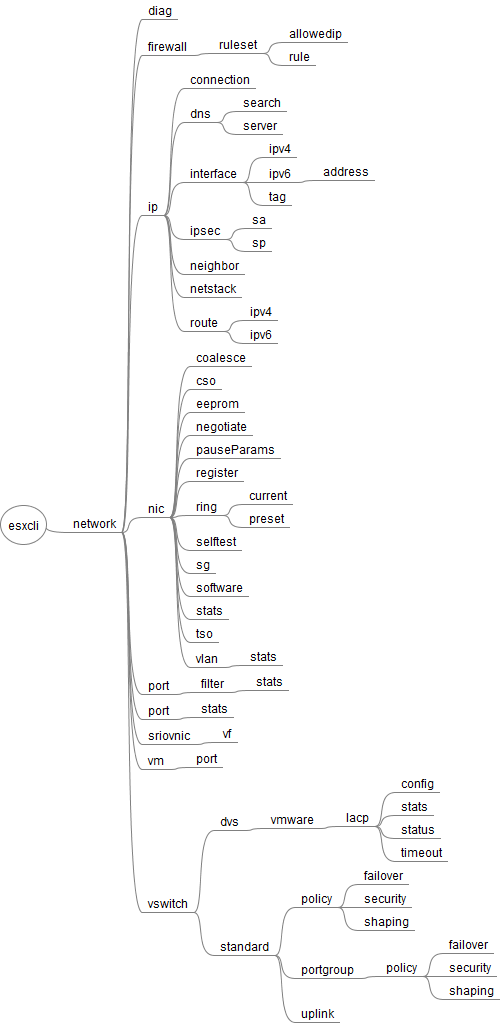
RDMA (New in vSphere 6.0)
Provides information and statistics about Remote Direct Memory Access (RDMA).
![]()
SCHED
This sched namespace manages VMKernel scheduling functions.
![]()
SOFTWARE
The software namespace can be used to install updates and additional packages. It also allows you to set the software acceptance level to use vib packages created by the community.
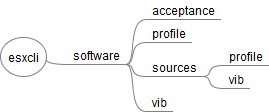
STORAGE
The storage namespace has a lot of use cases. You can configure lun masking, mount nfs shares, manage vmfs filesystems and investigate the path configuration.
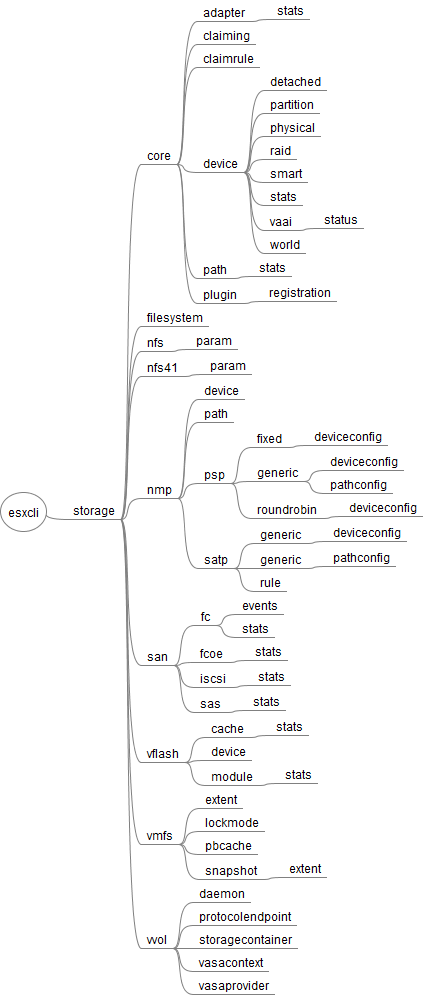
SYSTEM
Any ESXi host related configuration tasks can be performed with the system namespace.
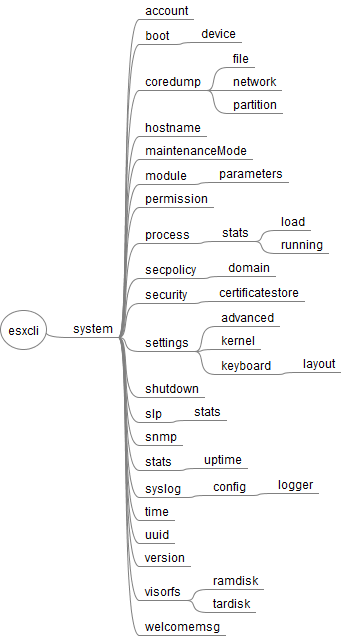
VM
The vm namespace is useful during troubleshooting. It can be used to forcibly kill virtual machines that are stuck and not responding to normal stop operations.
![]()
VSAN
The vsan namespace manages the Virtual SAN feature, introduced with vSphere 5.5.
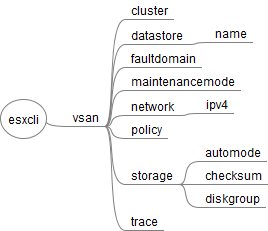
All together
This is a complete mindmap of all esxcli commands. It's quite large, but if you print it to A4 or letter, you can still read it.
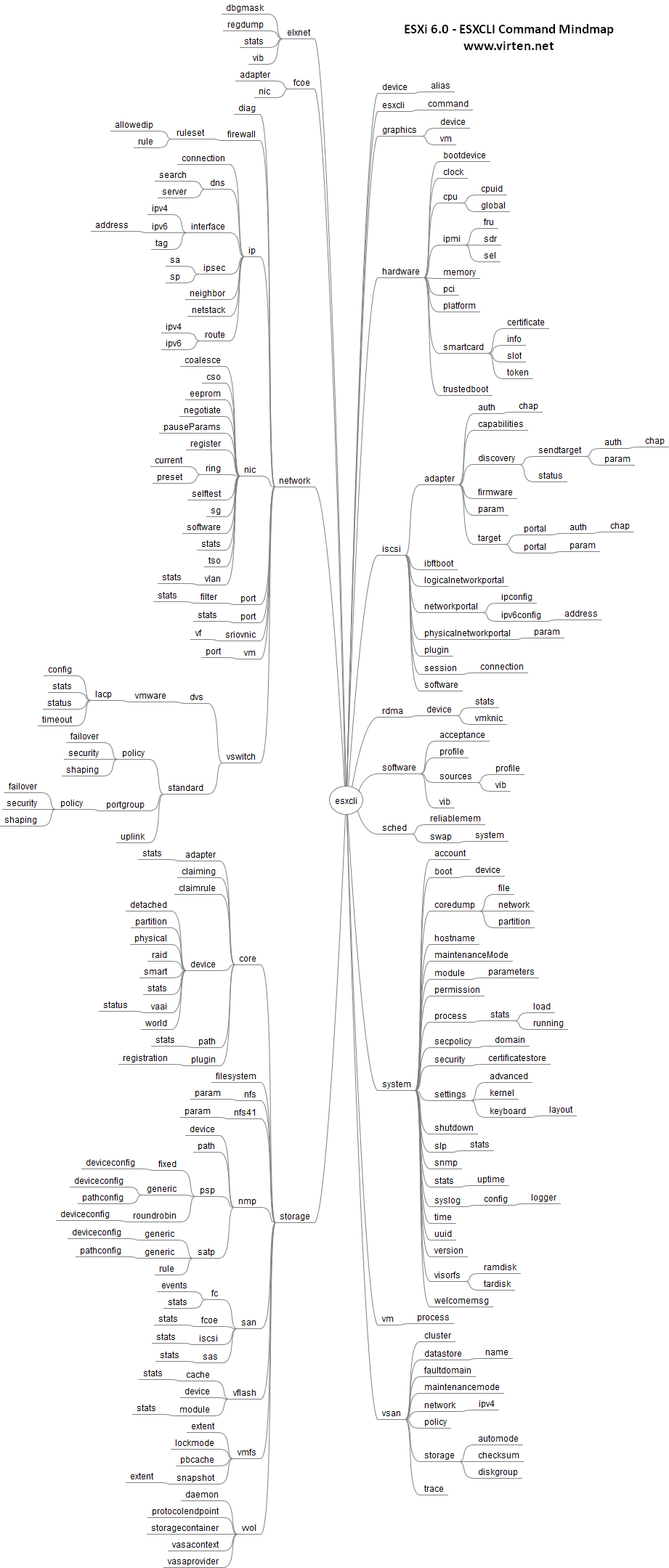
Very cool, I like it a lot. Did you automate the creation of this or type it?
Thank you. It's created with esxcli csv output + Excel + FreeMind. FreeMind can import Excel spreadsheets.
Nice!! I love it.
I had an idea a couple of weeks back to create this same thing but for 'vsish' because it's so undocumented. When I took a look though, I realized just how massive it is and chickened out :-)
Thanks for this!
Pingback: vSphere 6.0 Link-O-Rama » Welcome to vSphere-land!
This is brilliant!
Are you aware of any method to create a mindmap of PowerCLI commands?
What kind of mindmap are you expecting with PowerCLI commands? ESXCLI is tree structured while PowerCLI is just a list of commands with parameters. Not sure how to get this simple list into a Mindmap...
However, you can get a list of all commands with "Get-Command -Module VMware*". Feel free to explain what structure you are expecting and I will see if it's possible.
fgrehl, there are just so many cmdlets available, it's a bit overwhelming at times when trying to find the command I need to execute the idea of what I would like to accomplish. I realize the VMware cmdlets and POSH in general is much more dynamic; however, some of it is still very static. I was thinking if there was a way to take all available cmdlets and expand all properties, methods, parameters, arguments, etc. It would be lengthy list but an easily searchable one as well. Similar to the cmdlets outlined in Reference Posters. Just with more detail.
Unfortunately not everyone has access to PowerCli all of the time. I am familiar with PowerCLI and in my environment I am not allowed to use it. So this is very helpful and very useful. Thanks it is awesome.